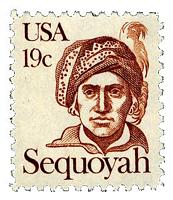
• Glosbe : dictionnaire cherokee-français
• CherokeeDictionary : dictionnaire cherokee-anglais & base de données
• Manataka : dictionnaire thématique cherokee-anglais
• Cherokee nation : vocabulaire thématique anglais-cherokee
• Cherokee words for body parts : les parties du corps humain
• Trees : arbres
• Plants : plantes
• Animals : animaux
• Animals tracks : traces d'animaux
• Birds : oiseaux
→ clavier cherokee pour écrire les caractères de l'alphabet tsalagi
→ conversion alphabet tsalagi <> latin
• The Cherokee nation and its language par Margaret Peake Raymond (2008)
• The typographic inception of the Cherokee sillabary par Patrick Giasson (2004)
• The Cherokee syllabary from script to print par Ellen Cushman, in Ethnohistory (2010)
• Cherokee writing reexamined: a linguistic analysis of the Cherokee syllabary, par Melissa Klein, mémoire (2019)
• Sequoyah, innovative creator of the Cherokee syllabary, Georgia Historical Society (2017)
• A reference grammar of Oklahoma Cherokee par Brad Montgomery-Anderson (2008)
• Cherokee grammar par Durbin Feeling (1975)
• Handbook of the Cherokee verbs par Durbin Feeling, Craig Kopris, Jordan Lachler, Charles van Tuyl (2003)
• Tone and accent in Oklahoma Cherokee par Hiroto Uchihara, thèse (2013)
Le cherokee est aujourd'hui parlé principalement dans l'État de l'Oklahoma. À l'origine, ces Amérindiens résidaient au sud des Appalaches (états actuels du Tennessee et de Caroline du Nord). En 1838, ils ont été contraints de se déplacer au nord-est de l'Oklahoma.
Le cherokee utilise un alphabet syllabaire créé, en 1821, par Sequoyah.
Le botaniste autrichien Stephan Endlicher est à l'origine du nom de séquoia, paru dans son ouvrage Synopsis coniferarum (1847), pour désigner l'arbre surtout répandu en Californie, appelé redwood. Il ne donne pas d'explication pour ce choix, il a cependant réalisé des travaux de linguistique : on peut donc estimer qu'il a choisi ce nom en hommage au créateur de l'alphabet tsalagi, d'autant plus qu'aucune autre étymologie ne peut expliquer l'origine de ce nom.
Sequoyah : ᏎᏉᏯ

• Literature of the Cherokees par George Foster (1889)
• Story of the Cherokee Bible (1899)
• The Swimmer manuscript : Cherokee sacred formulas and medicinal prescriptions, par James Mooney, revu et complété par Frans Olbrechts (1932)
• The sacred formulas of the Cherokees par James Mooney (1891)
• Gateway : traduction du Nouveau Testament en cherokee, American Bible Society (1860)
• Cherokee New Testament : Nouveau Testament en cherokee (alphabets tsalagi & latin) & anglais
• Le Nouveau Testament traduit en cherokee, par Samuel Worcester & Elias Boudinot (1860)
• The shorter catechism : le petit catéchisme traduit en Cherokee, par Amory Chamberlin (1892)
• Cherokee hymns (1909)
• Cherokee hymn book par Samuel Worcester & Elias Boudinot (1896)
• The Cherokee singing book (1846)
• Boston Athenæum : livres en cherokee
• Library of Congres : Cherokee phoenix, ᏣᎳᎩ ᏧᎴᎯᏌᏅᎯ (1828-1829) le premier journal amérindien
ᏂᎦᏓ ᎠᏂᏴᏫ ᏂᎨᎫᏓᎸᎾ ᎠᎴ ᎤᏂᏠᏱ ᎤᎾᏕᎿ ᏚᏳᎧᏛ ᎨᏒᎢ.
ᎨᏥᏁᎳ ᎤᎾᏓᏅᏖᏗ ᎠᎴ ᎤᏃᏟᏍᏗ ᎠᎴ ᏌᏊ ᎨᏒ ᏧᏂᎸᏫᏍᏓᏁᏗ ᎠᎾᏟᏅᏢ ᎠᏓᏅᏙ ᎬᏗ.
• About the nation : culture & histoire
• The Cherokee country : carte du pays Cherokee
• L'institution particulière au sein de la nation cherokee : de l'acculturation stratégique à l'émergence d'un « État sudiste » à l'Ouest (1815-1861), par Augustin Habran, in Mémoire(s), identité(s), marginalité(s) dans le monde occidental contemporain (2018)
• Commerce et diplomatie avec les Cherokees dans les Carolines avant la « Piste des larmes », par Anne-Marie Libério (2013)
• The shifting map of Cherokee land use practices in Indian territory par James Parins, in Elohi (2012)
• Reclaiming a story : recasting the Cherokee image through melodramatic narrative, par Eddie Glenn, in Activist media and biopolitics (2012)
• European trade goods at Cherokee settlements in Southwestern North Carolina, par Chris Rodning, in North Carolina archaeology (2010)
• Cherokee households and communities in the English contact period (1670-1740) par Jon Marcoux, thèse (2008)
• History of the Cherokee Indians and their legends and folk lore, par Emmet Starr (1921)
• Myths of the Cherokee par James Mooney (1902)
• The Cherokee river cult par James Mooney, in The Journal of American folk-lore (1900)
• The Cherokee ball play, in The American anthropologist (1890)
• Se-quo-yah, the American Cadmus and modern Moses: a complete biography of the greatest of Redmen, around whose wonderful life has been woven the manners, customs and beliefs of the early Cherokees, par George Foster (1885)
→ États-Unis : cartes & documents
→ forum Babel : études & recherches sur les langues d'ici & d'ailleurs
• livres